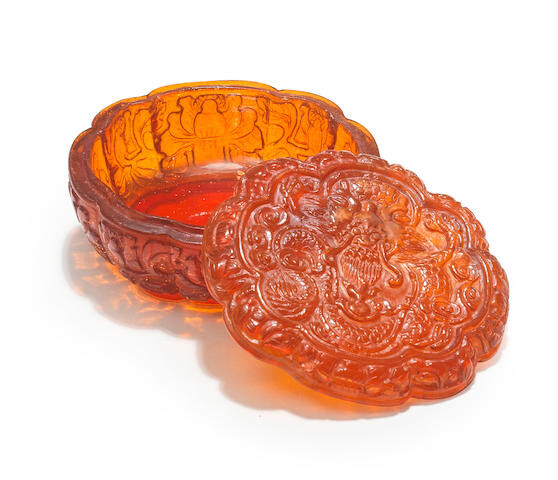A VERY RARE CARVED AMBER MELON-SHAPED 'DRAGON' BOX AND COVER
18th century
18th century
The lobed vessel of warm honey tone, crisply carved to the cover with a front-facing writhing dragon grasping a flaming pearl amongst billowing cloud scrolls, all within a shaped cartouche, the curving sides with panels of formal lotus flowerheads, the gently curving box similarly carved with lotus, wood stand. 5.6cm (2 1/4in) wide. (3).
十八世紀 琥珀雕龍紋海棠形蓋盒
Provenance:
Parry Collection, London, and thence by descent
來源:
倫敦Parry家族收藏,並由後人保存迄今
Notable for its refined carving and the attractive translucent golden-honey tone of the amber, which has been sensitively carved in the shape of a segmented melon, the present box is a rare example dating to the 18th century.
The auspicious designs depicted on the present box would have made it a suitable objects used by the Imperial family or high-ranking members of the Court. Dragons embodied royalty and dominion in China, and when clutching the flaming pearl, expressed the visual metaphor of the good ruler who behaved wisely for the well-being of his subjects.
Amber was a highly revered material and would have required great skill and precision to successfully render the shape of the melon as well as the finely-detailed decorations of the dragon and lotus. Amber is also known as hu po, which can be translated as 'the tiger's soul'. As the tiger is considered to be the king of beasts in China, amber is therefore associated with the strong qualities of the tiger including the ability to capture and chase away evil spirits. It also symbolises longevity.
The art of amber carving reached its zenith during the 18th century, when a vast range of objects was produced at both the Imperial Workshops located in the Forbidden City and at select ateliers in Suzhou.
Although amber boxes dating to the 17th and 18th century are rare, the shape of the present box and the arrangement of decorative designs on its cover and body closely compare with a lacquer lobed box decorated with dragons, mid Qing dynasty, illustrated in The Complete Collection of Lacquer, vol.6, Fuzhou, 1993, pl.138.
Compare with a related amber 'dragon' washer, Qing dynasty, which was sold at Sotheby's New York, 17 March 2015, lot 308.
上佳褐紅蜜色透明琥珀琢制,質地通透,流光溢彩。淺浮雕開光雲龍紋,龍目圓睜,揚須擺尾,矯健威猛,雕工一絲不苟。
琥珀者,古代松柏等樹脂的化石。中國古代有許多關於琥珀的神奇傳說,如稱琥珀為「虎魄」,認為琥珀是老虎的魂魄;中醫認為其有通淋化瘀、寧心安神之功效;佛經中亦曾多次提及琥珀為「異類珍財」、「上妙供具」。十八世紀,琥珀工藝臻善,清宮造辦處與蘇州作坊皆出產各式琥珀製品。
現存十七至十八世紀的琥珀蓋盒存世極少,但本例造型紋飾在漆器製品上偶有可見,如一例清中期戧金彩漆雲龍菊瓣式盒,見《中國漆器全集》,卷六,福州,1993年,圖版138。
紐約蘇富比曾售一例清琥珀雕雙龍戲珠紋花瓣洗,2015年3月17日,拍品編號308,可資比對。
View it on
Sale price
Estimate
Time, Location
Auction House
18th century
18th century
The lobed vessel of warm honey tone, crisply carved to the cover with a front-facing writhing dragon grasping a flaming pearl amongst billowing cloud scrolls, all within a shaped cartouche, the curving sides with panels of formal lotus flowerheads, the gently curving box similarly carved with lotus, wood stand. 5.6cm (2 1/4in) wide. (3).
十八世紀 琥珀雕龍紋海棠形蓋盒
Provenance:
Parry Collection, London, and thence by descent
來源:
倫敦Parry家族收藏,並由後人保存迄今
Notable for its refined carving and the attractive translucent golden-honey tone of the amber, which has been sensitively carved in the shape of a segmented melon, the present box is a rare example dating to the 18th century.
The auspicious designs depicted on the present box would have made it a suitable objects used by the Imperial family or high-ranking members of the Court. Dragons embodied royalty and dominion in China, and when clutching the flaming pearl, expressed the visual metaphor of the good ruler who behaved wisely for the well-being of his subjects.
Amber was a highly revered material and would have required great skill and precision to successfully render the shape of the melon as well as the finely-detailed decorations of the dragon and lotus. Amber is also known as hu po, which can be translated as 'the tiger's soul'. As the tiger is considered to be the king of beasts in China, amber is therefore associated with the strong qualities of the tiger including the ability to capture and chase away evil spirits. It also symbolises longevity.
The art of amber carving reached its zenith during the 18th century, when a vast range of objects was produced at both the Imperial Workshops located in the Forbidden City and at select ateliers in Suzhou.
Although amber boxes dating to the 17th and 18th century are rare, the shape of the present box and the arrangement of decorative designs on its cover and body closely compare with a lacquer lobed box decorated with dragons, mid Qing dynasty, illustrated in The Complete Collection of Lacquer, vol.6, Fuzhou, 1993, pl.138.
Compare with a related amber 'dragon' washer, Qing dynasty, which was sold at Sotheby's New York, 17 March 2015, lot 308.
上佳褐紅蜜色透明琥珀琢制,質地通透,流光溢彩。淺浮雕開光雲龍紋,龍目圓睜,揚須擺尾,矯健威猛,雕工一絲不苟。
琥珀者,古代松柏等樹脂的化石。中國古代有許多關於琥珀的神奇傳說,如稱琥珀為「虎魄」,認為琥珀是老虎的魂魄;中醫認為其有通淋化瘀、寧心安神之功效;佛經中亦曾多次提及琥珀為「異類珍財」、「上妙供具」。十八世紀,琥珀工藝臻善,清宮造辦處與蘇州作坊皆出產各式琥珀製品。
現存十七至十八世紀的琥珀蓋盒存世極少,但本例造型紋飾在漆器製品上偶有可見,如一例清中期戧金彩漆雲龍菊瓣式盒,見《中國漆器全集》,卷六,福州,1993年,圖版138。
紐約蘇富比曾售一例清琥珀雕雙龍戲珠紋花瓣洗,2015年3月17日,拍品編號308,可資比對。



